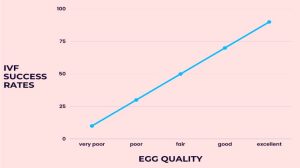Navigating the IVF (in vitro fertilization) journey can be complex, and egg quality is at its heart.
This guide will unpack egg quality’s vital role in IVF success. We’ll explore how it’s measured, why it’s essential, and what you can do to ensure the best outcomes.
Dive in to learn more about:
Table of Contents
ToggleWhat Is Egg Quality and Why Is It Crucial in IVF?
Egg quality shows how healthy an egg is. A healthy egg can:
- grow well,
- combine with sperm (fertilization) and
- make a baby.
Understanding egg quality helps determine
- how many IVF cycles you might need
- whether the baby needs special genetic testing
This knowledge is crucial for anyone thinking about IVF.
Importance of Egg Quality in IVF Success Rates
Egg quality is vital for IVF success. High-quality eggs lead to 81% of successful pregnancies. Low-quality eggs have only 66% success.
This is because healthy eggs have a more stable structure. They also contain better materials.
The Process of Egg Quality Assessment: How Is Egg Quality Graded in IVF?
Doctors use many ways to check egg quality. Some standard tests include:
- Looking at the egg’s shape
- Checking the cumulus-oocyte complex
- Measuring the zona pellucida thickness
- Spindle imaging
- Time-lapse imaging
- Genetic testing
Each test has its benefits. Looking at the egg shape provides quick, simple info about the egg. Others, like spindle and time-lapse imaging, show the egg’s potential to grow.
Genetic testing doesn’t check the egg directly. Instead, it can show if a baby made from that egg would be healthy.
What Are the Different Grades of Egg Quality?
Doctors grade eggs on how they look. There are four grades:
- Grade 1 eggs are the best. They look smooth and round. Everything inside is clear and normal.
- Grade 2 eggs are good but could be better. They might have small bumps or spots.
- Grade 3 eggs have more issues. They could be uneven or show signs of problems inside.
- Grade 4 eggs have lots of problems. They’re the lowest grade.
Selection Criteria for Egg Transfer: How Do Doctors Select Eggs for Transfer in IVF?
Doctors select eggs for transfer based on:
- Egg quality grades
- The number of your eggs
- Your health history
- Genetic tests (that find abnormal eggs).
How Does Egg Quality Affect Implantation and Pregnancy Outcomes?
We know good eggs boost pregnancy chances. But what about the actual pregnancy outcome?
Good eggs make better embryos (an embryo is the early form of a baby). These better embryos have a 79% chance of sticking to the womb. Poor embryos only have a 48% chance.
Good eggs trigger the right changes in the womb lining. This makes it easier for the embryo to stick and maintain a pregnancy. So, using good eggs improves your chance of a baby.
Embryo Quality and Recurrent Pregnancy Loss
Bad eggs lead to more miscarriages. For example, in one study, young women with good eggs had a 19% miscarriage rate. Older women with poorer eggs had a 34% rate.
This is because bad eggs often have wrong chromosome numbers. They make embryos with bad genes. When these embryos stick to the womb, they don’t grow right. This leads to miscarriages.
Embryo Quality and Unexplained Infertility
Unexplained infertility is when doctors can’t find a reason for why you’re not getting pregnant. Some data suggests that subtle issues with egg quality may be the cause.
Studies also show that good-quality embryos raise your chances of IVF. So, better eggs might be the key to solving some of these unexplained cases. But more research needs to test this.
Should You Transfer a Lower-Grade Egg if You Don’t Have Any High-Grade Eggs?
| Pros | Cons |
| Can lead to pregnancy with good sperm and uterus | Less chance of fertilization and implantation |
| Good option for patients with low egg supply or health issues | Higher risk of failed IVF |
| Could save money over many cycles | Emotional toll from possible failures |
| Some prefer using their own eggs for personal reasons | Higher risk of birth defects with low-grade eggs |
What Are the Options if You Have Limited High-Grade Eggs?
Don’t lose hope if you have a few good eggs. You have options. For example:
- Doing IVF more times raised birth rates to 34% in a study.
- Doctors can change your treatment to help your eggs grow better.
- Some women freeze their eggs or use eggs from a donor.
- Some supplements like coenzyme Q10 may help. It raised pregnancies by 29% in a trial.
These choices can give you better odds of having a baby.
Donor Eggs as an Alternative
Sometimes, donor eggs are the best choice.
A study used 681 donor eggs in 100 women. About 79% of eggs survived. Of these, 90% got fertilized, and 38% led to pregnancy.
As women age, they have fewer good eggs. Also, conditions like endometriosis can ruin the egg supply. Donor eggs can give you a fresh chance of having a baby.
Takeaway
Better eggs can make your IVF journey smoother. But this does not mean a poor-quality egg can not lead to a baby.
So, regardless of your egg quality, talk to your doctor. Many options can help.
Ready for the next step? Contact us today. Let’s bring your dream to life!
Anna Haotanto is the Founder of Zora Health and a passionate advocate for women’s empowerment. Anna’s personal experiences with egg-freezing, PCOS and the challenges of fertility have fueled her mission to provide high-quality information, financing, and support to help women and couples navigate their fertility journeys with confidence. She is also recognised for her achievements in finance, entrepreneurship, and women’s empowerment, and has been featured in various media outlets. You can also follow her on Linkedin or Instagram.





